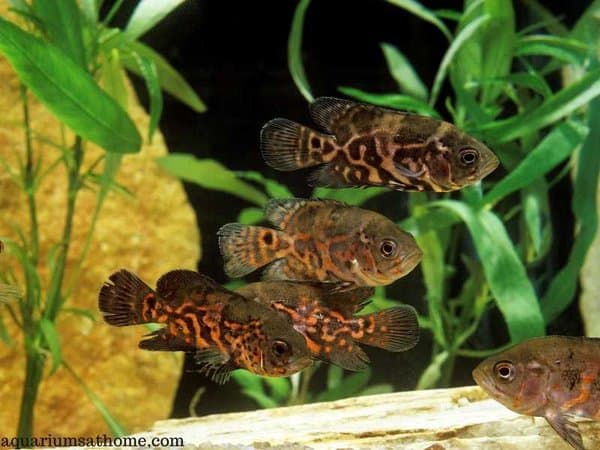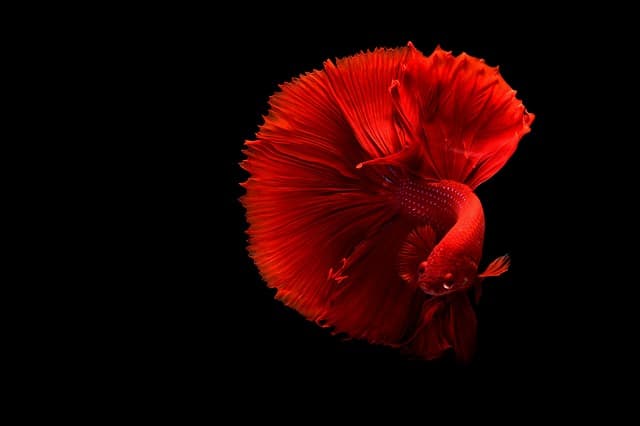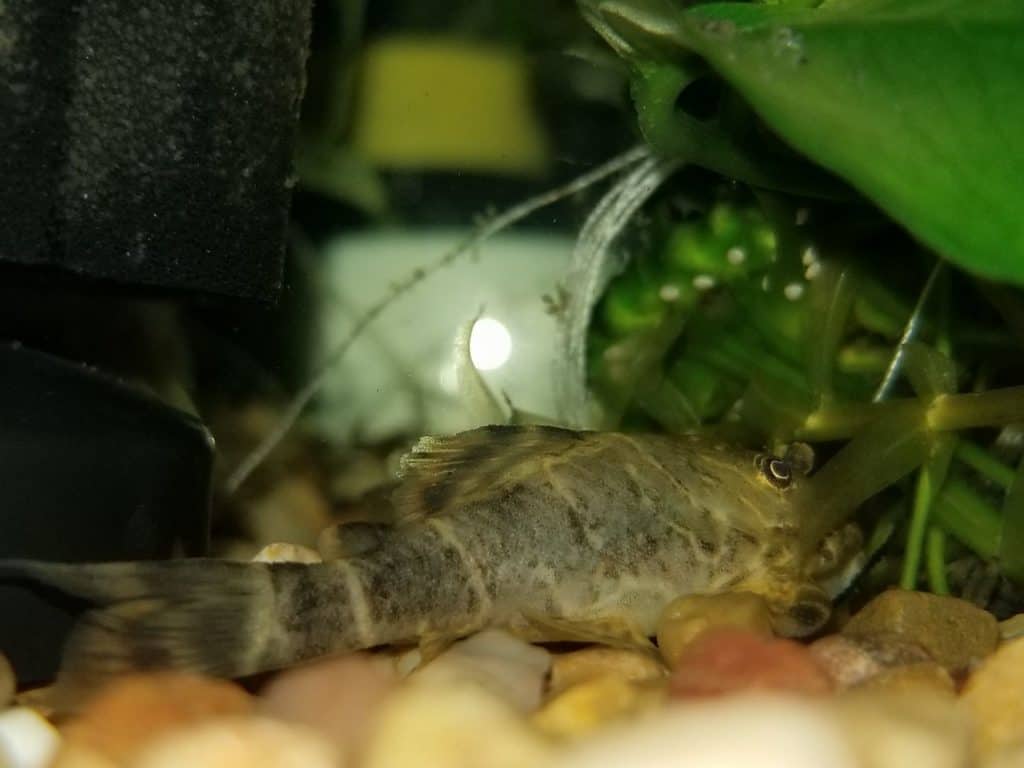Oscar fish are highly popular in the aquarist trade. Originating in the warm, tropical waters of South America near the Amazon River basin, experienced, ‘big aquarium’ hobbyists are drawn to their playfulness and intelligence, not to mention their visual appeal. If you have Oscars and want to breed them, you may be wondering if they eat their babies?
Yes, Oscar fish will eat their eggs and/or fry. Should the eggs be laid and not fertilized, Oscars will typically consume them. As well, if the mated pair is stressed or views the environment as unsafe, they may also eat their offspring.
Now that you know Oscars can and will eat their young, let’s explore this topic further and in more detail. Together we’ll learn why this happens and how to prevent it. We’ll also discover how may offspring they have in a single breeding season, how many times a year Oscars lay eggs, and how to recognize if a female is pregnant.
So, if you’re ready to learn more, then let’s ‘dive deeper’ into the aquatic world and reproductive habits of the Oscar fish!
Do Oscar Fish Protect Their Babies?
In the wild, Oscar fish fry will stick close their parents in the first few weeks of life. In captivity, however, youngsters need to be removed from the adults lest they be eaten. Oscars are known to be aggressive and territorial in a contained environment – they’ll eat their own offspring if stressed, overcrowded, or underfed.
Why Do Oscar Fish Eat Their Offspring?
Oscar fish eat their offspring for three reasons. One, they’re hungry and eggs/fry make for an easy meal. Two, the eggs have gone unfertilized, so the adults consume the nonviable young. Three, the parents are stressed or living in an unsafe environment, so they eat the eggs before they have a chance to hatch.
How to Prevent Oscars from Eating Their Offspring?
To prevent Oscars from eating their offspring, you must remove the parents from the breeding tank as soon as the eggs are fertilized. If you leave them in the same tank with their young, the likelihood of the fry surviving is minimal – about a 1 in 4 chance.
The only way for fry to survive in a community environment is if they have plenty of coverage and/or hiding places. A planted tank or an aquarium with lots of floating greenery, rocks, driftwood, caves, etc. gives baby Oscars a fighting chance at life.
Yet another way to deter Oscars from eating their young is to keep them well fed. Oscar fish are large and active. Therefore, they need plenty of food to sustain them. Feeding them twice per day with high-quality, protein-rich food should help keep them full enough to leave eggs and/or fry alone.

Will a Planted Tank Prevent Oscars from Eating Their Offspring?
Lots of coverage and/or hiding places in a tank is the best way to prevent Oscar fish from eating their offspring. Adult fish instinctively consume meals that are easy to catch. Eggs and fry are small, slow-moving, and represent little to no challenge. As well, Oscars are big by aquarium standards and need to eat a lot to prevent them from becoming aggressive.
Floating plants are great for an Oscar fish tank. Water moss, water butterfly, and salvinia natans are recommended. If you choose rooted plants, make sure they’re thick to prevent Oscars from pulling them up. Java moss, Amazon sword, and Vallisneria are great examples. You can also add rocks, driftwood, caves, and other aquarium decoration to help provide coverage for baby Oscars.
What to Do with Oscar Fish Eggs Once They’ve Been Fertilized?
After fertilization has taken place, you must remove the parents from the breeding tank and place them back in the main aquarium. If breeding has taken place in the main aquarium, then you must scoop up the eggs and place them in a separate tank as soon as possible. If you leave the parents in the same tank as the eggs, they’ll likely be eaten before they have an opportunity to hatch.
What to Do with Baby Oscar Fish Once They’ve Hatched?
Once baby Oscars have hatched, you must keep them away from their parents until they reach a size big enough not to be viewed as prey for adult fish. Anything tiny that can easily into an Oscars mouth is ‘fair game’ and likely to be eaten. Keep young Oscars in the breeding tank until they reach at least 4 inches in length at which point, you can safely return them to the main tank with their parents.
How Many Babies Do Oscar Fish Have?
In a single breeding season, Oscar fish females can lay anywhere from 300 to 3000 eggs! The number of eggs is dependant upon the size of the female. Smaller Oscars will lay 300 to 500 whereas larger females will lay 2500 to 3000. As females age, they also tend to produce more eggs.
What’s the Survival Rate for Baby Oscar Fish?
Under the best aquatic conditions, the survival rate for Oscar fry is about 25%. To improve their chances, keep them away from their parents until they’re at least 4 inches long. As well, provide lots of coverage (plants, rocks, caverns, etc.) for juveniles to hide and/or escape the attentions of adults, if need be.
Also, make sure to maintain good water quality – test parameters regularly and do routine partial water changes – and be prepared to upsize your aquarium. Be observant of your tank’s activity and watch for bullying by other fish. And finally, keep tank inhabitants well fed.
How Many Times a Year Do Oscars Lay Eggs?
Oscar fish will reproduce 3 to 4 times per year. In a clean, safe aquatic environment with the correct temperature and pH will also increase the chances of breeding. Warmer water, plenty of flat surfaces in which to lay eggs, and an abundance of protein-rich food will also boost their reproduction rate.
Mimicking their natural habitat as closely as possible is the best way to encourage breeding – clear, slow-moving water with a sandy bottom is recommended. As well, 8-10 hours of light is preferable since anymore then 12 hours will cause Oscars to become agitated and lessen their chances of breeding.

How Do I Know My Oscar Fish is Pregnant?
Following the typical signs of breeding (locking lips, chasing each other, shivering, shaking, etc.), you should notice your Oscar fish female getting bigger around the belly. The mated pair will also start to ‘nest’ by rearranging rocks and fanning them to prevent them from being smothered with sediment. They also may become more territorial and aggressive towards fellow tankmates.
Final Thoughts
To summarize, Oscar fish have been known to eat their own offspring. If eggs are laid but not fertilized, adult Oscars will usually consume them. Also, if the mated pair views the environment as overcrowded or unsafe, stress will force them to eat their young. And lastly, a lack of food will also cause them to eat their babies.
I trust this article has answered your questions regarding Oscar fish and their reproductive habits. Thanks for reading and good luck with your aquarist hobby!
Recommended Posts
Best Tank Size for Oscar Fish (55, 65, 75, 90 or 125 Gallons?)
Can Oscar Fish be Used in Aquaponics?
How to Breed Oscar Fish in an Aquarium
Why Do Oscar Fish Open Their Mouths Wide?




